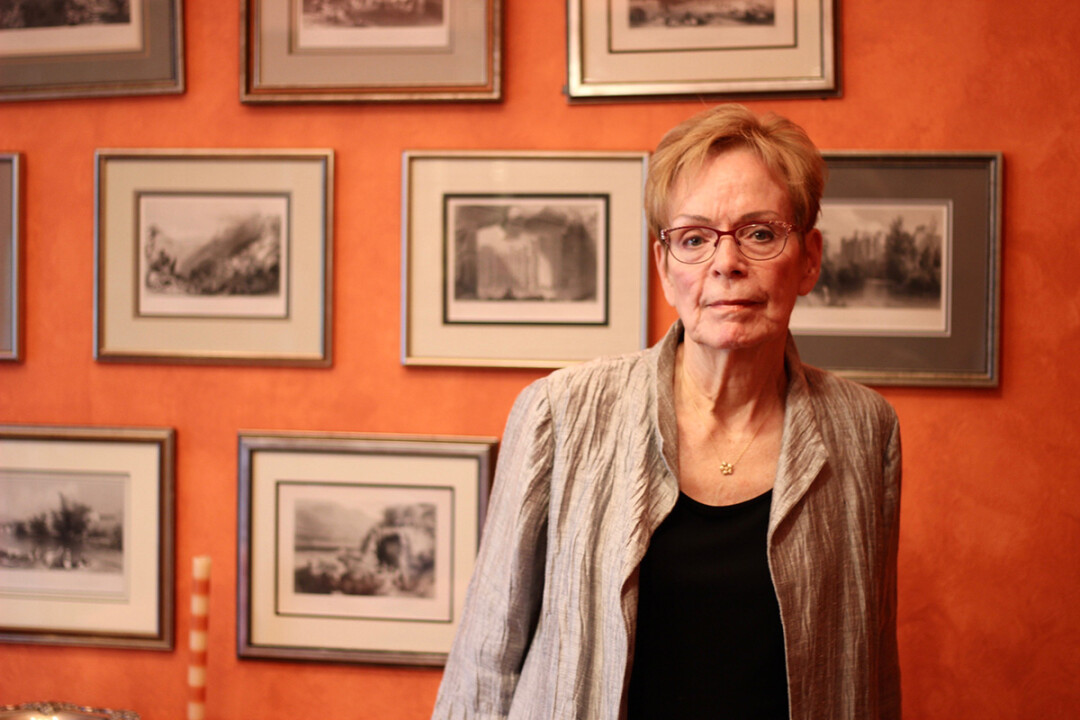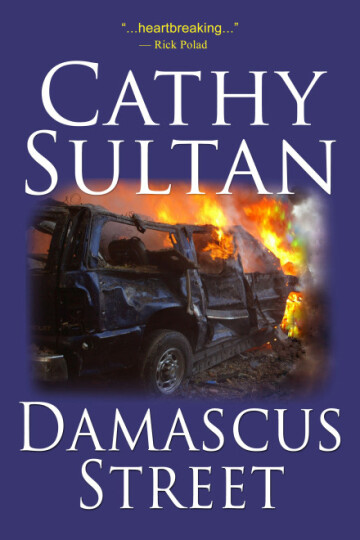Words From the Street: Page-turner rooted in deep knowledge of Middle East
Tom Giffey, photos by Rachel Worthing |

By her own description, Chippewa Valley author Cathy Sultan leads two lives and lives in two cultures. One life is deeply rooted in Eau Claire, where she and her husband, Michel, have lived for more than 30 years. Her second life is in Beirut, Lebanon, where her family resided for 14 years before fleeing with little more than their lives from a civil war that tore that nation apart and ultimately left at least 120,000 people dead.
“The Middle East is a very complicated issue, and maybe the best way to tell the story is through fiction.” – Cathy Sultan, author, Damascus Street
Sultan told the story of her life in Lebanon in her first book, aptly titled A Beirut Heart. Two acclaimed nonfiction books about Middle East conflicts followed before her editor, Ian Graham Leask of Minneapolis-based Calumet Editions, gave her a challenge: trying her hand at a novel. “The Middle East is a very complicated issue,” she explained in a recent interview, “and maybe the best way to tell the story is through fiction.”
That challenge led to her first novel, The Syrian, published in 2014. The novel was the first of a planned trilogy, the second part of which arrived this spring in the form of Damascus Street. Damascus Street is a real street in Beirut: During the Lebanese Civil War, the street formed the “Green Line” that separated warring factions; crossing to the wrong side of the street could mean death at the hands of a sniper or being pulled from your car at a militia checkpoint and killed. While the new novel’s story begins in 2006 – 16 years after the end of that war – life in Lebanon is still marred by violence and uncertainty.
“Superficially, it looks like a beautiful, functioning, cosmopolitan city, but if you scratch the surface, there’s ugliness,” Sultan says of present-day Beirut.
As Damascus Street opens, a short but bloody conflict between Israel and Hezbollah militants in southern Lebanon had just occurred, and there are indications that forces far beyond the Middle East have further plans for war. The previous novel ended with a cliffhanger: The heroine, Nadia – a Lebanese diplomat – was kidnapped by her longtime nemesis, a Syrian intelligence operative, Jaafar – the man who had imprisoned her now-dead husband for years. Now, Nadia finds herself trapped in a gilded cage: Jaafar’s palatial home in Syria. Jaafar, it seems, is in love with Nadia, and she soon determines that her only path to freedom runs through manipulating his feelings for her.
Meanwhile, across the border in Lebanon, Nadia’s fiancé, Andrew, an American doctor, must delve into the murky world of spies, violence, and geopolitical chess in the hopes of rescuing his beloved. Can he trust Lebanese intelligence official Fouad, a newfound friend who seems a little too friendly? What about the dedicated but unscrupulous journalist Nadia, who holds a dark secret? Or the American diplomat, Jenkis, who offers help in finding Nadia? As with real life in the Middle East, It’s often difficult to know who to trust and who is really pulling the strings. It is, however, clear that things are going to get explosive – and they do, quite literally, within the first few chapters of Damascus Street.
Sultan says virtually everything in her novel – except for her fictional protagonists – is based upon reality. During frequent return trips to the Middle East, she has visited the places where the action occurs, and she knows people who have experienced the recent conflicts firsthand. In addition, she says, she’s a news junkie who “asks a million questions” when she visits. Her research and experience has led her to certain conclusions about past events and what they portend for the future, and that comes through clearly in her fiction. For example, she believes that blame for the 2005 assassination of Lebanese Prime Minister Rafic Hariri falls on Israel rather than Hezbollah, the Shia militant group that the United States classifies as a terrorist organization. In addition, she says that the so-called “Arab Spring” uprisings – including the current war in Syria – weren’t locally driven but were instead spurred by the U.S. and its allies in the hopes of bringing about more regime change.
“There’s so much that’s about to happen in the Middle East,” including a potential proxy war between Israel and Iran, she says.
For those of us who aren’t experts, it’s easy to be confused by the constant rush of news from this part of the world, where conflicts go back thousands of years but are as fresh as the latest breaking bulletin. In real life, as in Sultan’s novel, there are few truly “good guys” and plenty of villains. Yet through her medium of fiction, Sultan is able to explain the historical and political origins of these conflicts without sacrificing her book’s pace.

Part geopolitical thriller, part romance, and part crash-course in the tragic history of Lebanon and its neighbors, Damascus Street will grip both readers who enjoy page-turners and those who seek a fuller understanding of the contemporary Middle East.
Damascus Street signing and reading by author Cathy Sultan • Tuesday, July 10, 7pm • The Volume One Gallery at The Local Store, 205 N. Dewey St., Eau Claire • the book is available at The Local Store and on Amazon.com




















